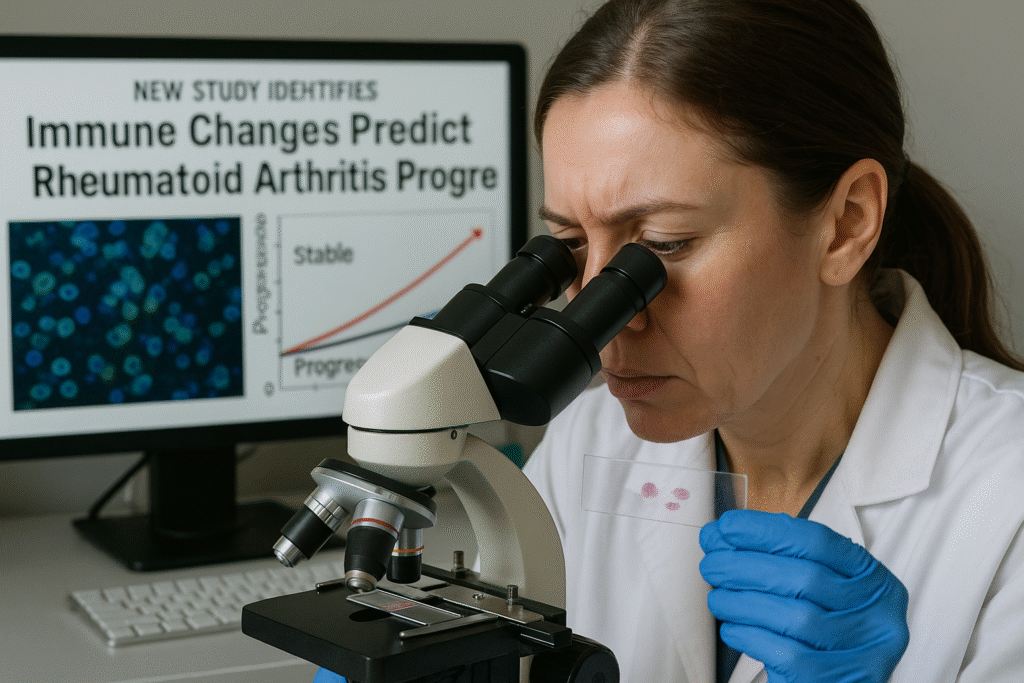By Harshit | September 29, 2025 | Washington, D.C. | 9230 AM EDT
Early Detection Could Change How RA Is Treated
Rheumatoid arthritis early detection is emerging as a critical tool in preventing the progression of this chronic autoimmune disease. A new study published in Science Translational Medicine has identified specific immune profile changes in individuals who eventually develop RA, raising hopes for earlier diagnosis and preventive therapies.
The findings could allow doctors to detect RA before the first swollen joint appears — a turning point after which the disease typically requires lifelong treatment.
Autoantibodies Alone Are Not Enough
RA is marked by the immune system mistakenly attacking healthy tissue, particularly the lining of the joints, leading to pain, swelling, and irreversible damage. Current treatments, such as disease-modifying antirheumatic drugs, can slow progression but cannot reverse damage once it begins.
For years, doctors have used blood markers such as anti-citrullinated protein antibodies (ACPA) and rheumatoid factor (RF) to identify individuals at risk of developing RA. These autoantibodies often appear three to five years before symptoms. But the challenge is that only 30–60% of people with elevated antibody levels actually go on to develop the disease, making prediction imprecise.
“Most people who are at risk for RA never develop the disease,” said Dr. Gary Friestein of the University of California, San Diego. “That makes prevention studies difficult because some individuals who do not need therapy will be treated with medicines that carry side effects.”
Tracking the Immune System in “Converters”
To improve rheumatoid arthritis early detection, researchers analyzed blood samples from 45 people considered “at risk” for RA. Of those, 16 eventually developed the disease during the follow-up period and were labeled “converters.” Another group of 38 healthy individuals served as controls, alongside 11 patients with early RA.
The study found that even before symptoms, at-risk individuals showed signs of systemic inflammation, including higher levels of inflammatory proteins and immune cells. Surprisingly, these inflammatory markers appeared in both converters and non-converters, making it difficult to distinguish who would progress.
The breakthrough came when researchers compared immune changes in converters just before and after their first symptoms appeared. They discovered that B and T lymphocytes — key immune cells — showed genetic and functional changes that shifted them toward a pro-inflammatory state.
“During this at-risk period, people may feel completely healthy, but their immune systems are already dramatically different,” said study author Dr. Mark Gillespie of the Allen Institute.
B Cells and T Cells Shift Toward Autoimmunity
The study revealed that naive and memory B cells in converters were “primed” to become antibody-producing cells, including those that target the body’s own joint tissue. Activated memory B cells in converters closely resembled those seen in early RA patients.
Helper T cells, which guide B cell activity, also showed signs of abnormal activation. Researchers found an increase in effector CD4 T cells — a subtype that promotes B cell activation — along with changes in gene regulation that primed naive T cells for future autoimmune activity.
Taken together, these shifts suggest that the immune systems of converters were already preparing to launch the autoantibody attack that drives RA progression.
Implications for Prevention and Public Health
These discoveries could reshape how RA is detected and managed. By focusing on immune profile changes rather than antibodies alone, doctors may be able to pinpoint which at-risk patients are most likely to develop clinical RA — and target them for early intervention.
“If we can prevent the first swollen joints or reset the immune system before disease onset, we could help people avoid full-blown RA altogether,” said Dr. Kevin Deane of the University of Colorado Anschutz, a co-author of the study. “That could have huge benefits for individuals’ well-being and for public health.”
Currently, some clinical trials are testing drugs like abatacept in antibody-positive individuals to see if preemptive treatment can delay or prevent RA. The new immune profiling data could refine these efforts by ensuring only high-risk patients receive therapy.
A Step Toward Precision Prevention
The study adds to growing evidence that RA is not a sudden disease but the culmination of years of subtle immune changes. By mapping these shifts, researchers are paving the way for rheumatoid arthritis early detection strategies.
“This study brings us closer to predicting who will develop RA and, more importantly, opens the door to interventions that could stop the disease before it starts,” Gillespie said.

